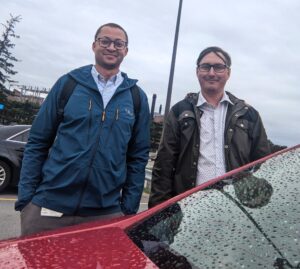
Steffen Behrens-Spraggins, Human Subject Research Coordinator II, Neurology (left) and Mitchell O’Connell, Assistant Professor, Biochemistry & Biophysics (right), are brother-in-laws who have been carpooling to work for about three years.
Tell us about your commute:
Steffen: We have a short commute and carpool together. We both live downtown a few blocks from each other. I used to use the University shuttle from the School of Music to the campus library. After moving, the shuttle was no longer realistic despite it actually driving right by my new house.
Dr. O’Connell: My commute is a short 10 or so-minute drive or bike from downtown Rochester to campus. If biking (when warm enough but not too warm) I mostly use the path by the river. When driving I often carpool with my brother-in-law who also works at URMC and lives just down the street from me.
——————–
Why did you start carpooling?
Steffen: The biggest reason was the cost. Carpooling with two people cuts the cost of parking in half. It’s also a nice way to check in with each other every day. My brother-in-law (who I commute with) works a pretty stressful job so it’s a good way to engage and vent any frustrations before starting the day.
Dr. O’Connell: I started biking and carpooling because my wife and I and my little son only have one car, and my wife often needs it for work and/or drop off or pick up. We don’t want a second car for environmental reasons, so this is one reason why I bike/carpool. Carpooling also means substantial cost savings on parking.
——————–
What are the benefits of carpooling?
Steffen: Obviously the cost is a great benefit. Instead of each of us paying 100% of the individual cost for parking, we both pay 50% of the cost for one person to park. When two people carpool, they share one permit and only pay 50% of the annual fee. For example, if the annual permit cost is $500, the discounted fee would be $250, so each person would pay only $125 per year. It’s a pretty good deal in terms of cost. We also save on fuel, wear, and tear, and lower our carbon footprint. Savings only increase as you add more people to your carpool.
Another big advantage of carpooling is that it tends to better prepare you for the day. It’s nice to have a conversation with someone who isn’t in your two main groups of people (home group and work group). It’s also great for your mental health to have a place to vent about anything so you don’t turn up to work or home frustrated. All of those frustrations can just fly out the window. Mitch is further along in his career but I think pursuing different paths allows us both to give and receive useful advice.
Dr. O’Connell: The benefits of carpooling are cost savings, less wear and tear on the car, and getting exercise when biking.
——————–
Do you have any tips for people who are new to carpooling?
Steffen: For those who are able to carpool, you can feel great about lowering your carbon footprint. It’s also important to come up with a consistent schedule so you are both on the same page about when to start and end work. You get a shared carpool permit with unlimited uses and occasional passes when you need to drive separately. I think people often believe that signing up for carpooling means that you always have to drive together, which isn’t true. Each occasional pass has 26 passes on it, so you can actually drive separately pretty often if needed. If you do decide to carpool, make sure you label the passes and keep track of how many temporary passes are left.
Dr. O’Connell: Be organized and don’t be afraid to try out biking and perhaps try out a new route on a weekend when you have more time.
